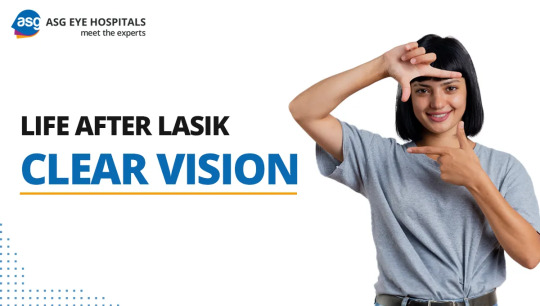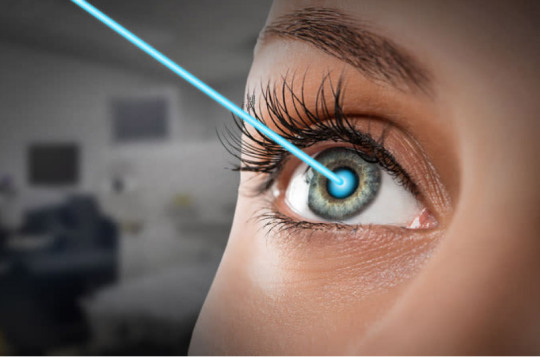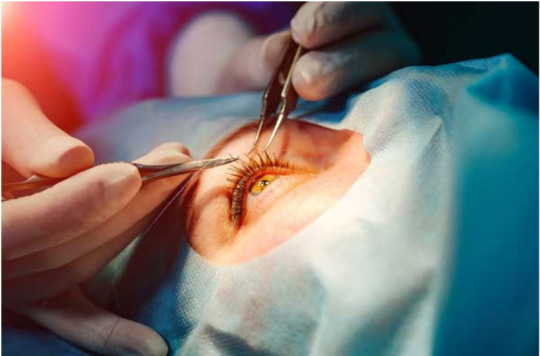#LASIK surgeon
Text
Can Lasik Surgery Correct Vision Problems Caused by Corneal Endotheliopathies?
If you’re dealing with vision problems from corneal endotheliopathies, you might be wondering if Lasik Surgery in Bangalore can help. At The Eye Foundation, I, Dr. Gitansha Shreyas Sachdev, have treated many patients with various vision issues, but Lasik isn’t always the right solution for every case. In this article, I'll explain if Lasik is a good fit for your condition and go over other treatments that might work better for you.
Understanding Corneal Endotheliopathies
Corneal endotheliopathies are conditions that affect the inner layer of the cornea, known as the endothelium. This thin layer of cells helps keep the cornea clear by regulating fluid balance. When this layer is damaged or dysfunctional, it can lead to corneal swelling, cloudiness, and vision issues. Some common types of corneal endotheliopathies include:
Fuchs' dystrophy
Posterior polymorphous dystrophy
Iridocorneal endothelial syndrome (ICE)
These conditions can cause a range of symptoms such as blurred vision, light sensitivity, and eye discomfort.
What Is Lasik Surgery?
Lasik (Laser-Assisted In Situ Keratomileusis) is a popular refractive eye surgery used to correct common vision problems like myopia (nearsightedness), hyperopia (farsightedness), and astigmatism. During the procedure, a laser is used to reshape the cornea, improving how the eye focuses light onto the retina.
Lasik is highly effective for many people looking to reduce their dependence on glasses or contact lenses, but it is not always suitable for all eye conditions, especially those involving the corneal endothelium.
Can Lasik Surgery Correct Vision Problems Caused by Corneal Endotheliopathies?
In most cases, Lasik surgery is not recommended for patients with corneal endotheliopathies. Since Lasik involves reshaping the cornea’s surface, it does not address the underlying issues in the corneal endothelium. If the endothelium is already compromised, Lasik could potentially worsen corneal swelling and lead to further vision problems.
Points to Consider Before Deciding on Surgery
If you're considering Lasik surgery, it’s essential to consult an eye specialist who can evaluate whether the procedure is right for you. Here are some points to consider:
Comprehensive Eye Examination: A thorough evaluation will determine the health of your cornea and whether you have any underlying conditions like corneal endotheliopathies.
Other Vision Problems: Lasik may be suitable for correcting refractive errors (nearsightedness, farsightedness, astigmatism) but won’t address other issues like glare, halos, or light sensitivity caused by corneal endotheliopathies.
Alternative Solutions: Be open to exploring alternative treatments like corneal transplants or specialty contact lenses that may better suit your condition.
Conclusion
If you're unsure whether Lasik surgery is right for your vision issues, it's important to seek expert advice. At The Eye Foundation, our team provides personalized recommendations based on your eye health. Whether you’re considering Lasik Surgery in Bangalore or exploring other treatments for corneal endotheliopathies, we're here to guide you.
#lasik surgery bangalore#lasik treatment#lasik surgeon#lasik eye surgery#lasik surgery#lasik treatment bangalore
0 notes
Text
LASIK Eye Surgery In Health Insurance
Are you considering LASIK eye surgery to remove your glasses or contacts permanently?
Then this blog will guide you to know about LASIK eye surgery, procedures, who can avail health insurance coverage options for this surgery – which will help you make an informed decision.
Note: If you’re planning for this surgery and if you’re not eligible for any health insurance cover for it, still getting it done from your own pocket will give you a clear vision without spectacles. Don’t buy health insurance keeping this surgery as the deciding factor. Health insurance has its own importance
0 notes
Text

Experience life with the clearest vision possible by consulting a top eye LASIK surgeon in Delhi. LASIK surgery is a life-changing procedure that can correct refractive errors like nearsightedness, farsightedness, and astigmatism, offering you the freedom from glasses or contacts. With advanced technology and skilled hands, the leading eye LASIK surgeon in Delhi can help you achieve the best vision in life, allowing you to see the world with unparalleled clarity and confidence.
0 notes
Text
Discover Clarity: Maida Custom Vision's IntraLase® Technology, Jacksonville, FL
Embark on a journey to clearer vision with IntraLase® technology at Maida Custom Vision, Jacksonville's premier LASIK eye center. Explore the benefits of flap-free LASIK for a safer, more precise experience.
0 notes
Text
1 note
·
View note
Text
About Dr Natasha Lim
Dr Natasha Lim is a graduate of the University of Nottingham Medical School in the United Kingdom (UK) as well as an associate of the Royal College of Ophthalmologists in London. She also underwent a residency training programme in Central London for Ophthalmology in the years 1998 to 2000. After completing the programme she obtained advanced surgical training at Moorfields Eye Hospital based in London which is one of the most renowned eye centres worldwide from 2001 to 2005. She was then appointed as a Specialist Fellow in Oculoplastic Surgery in 2005 followed by Corneo, Cataract and Refractive Surgery in the following 3 years.

After her decade-long stay in London, Dr Natasha Lim returned to her homeland of Singapore and was appointed as a consultant at the Cataract and Comprehensive Ophthalmology Service of the Singapore National Eye Centre. In 2011, she moved to become the Medical Director of The Lasik Surgery Clinic at Wheelock and Centre for Eye and Surgery.
Dr Lim is a fellowship-trained refractive surgeon with extensive research and clinical interests in Laser Refractive Surgery and Refractive Cataract Surgery. During her stay in London, she was a joint physician in London for an international clinical trial which abided by US FDA standards of a new generation excimer laser machine for an industry leader in the laser refractive industry. She is also a registered VISX excimer laser and IntraLase femtosecond laser practitioner in both the United Kingdom and Singapore.

The Dr Natasha Lim Eye Centre was awarded the Centre of Excellence for the use of LENTIS multi-focal intra-ocular lens implants for the correction of presbyopia during the Asia Pacific Association of Cataract and Refraction Refractive Surgeons in July 2013.
Dr Lim was invited as a panel speaker on LASIK for Abbott Medical Optics (AMO) who manufactures iDesign, VISX and Intralase lasers. She presented her LASIK results internationally at the Refractive Surgery meetings and is the only Singaporean Ophthalmologist elected to publish her results on the worldwide AMO iDesign Registry which provides guidance to other iLasik surgeons. She is regarded internationally as a pioneer in iDesign iLasik surgery in Singapore.

0 notes
Text

LASIK full form is Laser-Assisted In Situ Keratomileusis, It offers the promise of clear vision without the need for glasses or contact lenses. While the procedure itself is relatively quick and painless, adjusting to life after surgery can be an exciting yet slightly challenging process. In this article, we’ll delve into what you can expect after LASIK eye surgery, how your vision will evolve, and tips for a smooth transition to a glasses-free lifestyle.
#LASIK Eye Surgery#Laser-Assisted In Situ Keratomileusis#LASIK Surgery#Side Effects#Dry Eyes#Glare and Halos#Fluctuating Vision#LASIK surgeon#LASIK#full form of LASIK
0 notes
Text
What is Lasik Surgery and What Does It Do For You?
Do you know about LASIK surgery and how it can help you? You might have seen advertisements about them on Google or Facebook ads. Well we are here to share with you all about LASIK surgery in Singapore and what it does for you.

LASIK is the short form for Laser-Assisted In Situ Keratomileusis. I can only imagine how hard of a tough time you just had reading that. It is not easy to pronounce the whole phrase and hence the acronym as it makes it easier to share without having to struggle pronouncing it.
Well for starters, LASIK is a type of eye surgery that you can go through where a laser is used to sculpt the cornea of your eye to improve short-sighted vision known as myopia and far-sighted vision which is known as hyperopia.

The cornea is a transparent part that is at the front of your eye that allows light into your eyeball and retina which allows you to see. It is similar to a camera’s lens in a way. The image on your retina becomes fuzzy when your cornea begins to go out of shape.
LASIK will help to correct your misshapen cornea by using a laser to cut off the surface of your cornea and create a thin flap. An additional laser which is known as the excimer laser will come into play and help to shape the middle section of your cornea. After your cornea has been reshaped, the flap will be put back in place to cover your cornea. After it has been done, it naturally adheres to your cornea creating your eye’s own bandage.

This surgery is a 10 to 15 minutes day surgery that requires only a topical anaesthetic eye drops. It will be within a day or two but maximum within a week at most before improvements are made. You can then return back to your life as per normal however, you will be required to stay off all water and contact sports for a month.
Are There Any Side Effects That Comes Along With LASIK
For a short and simple answer it will be yes. For the longer answer it is still a yes. These effects are minimal, bearable and are often temporary. Listed below are the side effects.
Dry Eyes
This is mainly caused by the flap that was created and the effect of the laser on the cornea which will cut certain corneal nerves which are responsible for the normal tear production. It will take around a month before it resolves by itself.
Night Vision
It will be normal to see glares and starbursts at night, it is especially common for those with high myopia or high astigmatism. It will go away gradually over a period of time which will be around nine months to about a year.
Discomfort
Feeling discomfort and itchiness will be normal and is part of the healing and it will automatically go away by itself within a few hours after the procedure. Sleeping and constantly closing your eyes will help alleviate the sensation. For the itch it should disappear by itself in a few days, using the artificial tears eye drops which are preservative free will help.
What Are The Risks?
This is a very commonly asked question as everyone is surely concerned. Like many other surgeries out there which involve risk, LASIK also has its own set of risks which is listed as below.
Thinning of your cornea
This is an extremely rare risk however it does happen. Basically the cornea becomes irregular and unstable in a condition called post-LASIK ectasia.
Problems with future surgery
In the cataract surgery, an artificial lens is replaced with the one in your eye to help your vision be clearer. As your cornea is permanently changed due to LASIK, the calculations of the lens tend to be more difficult as it requires a normal cornea to get the correct reading. You may end up wearing glasses after you are done with your cataract surgery, which you would not have otherwise to do.
Wrong eye pressure readings
Having increased pressure on your eyeball is a condition called glaucoma. This can damage your optic nerve which can lead to poor eyesight or the worst case scenario is blindness. LASIK makes it harder to read your eye pressure which can lead to an inaccurate reading.
Relapsing
There is a chance of your old degree returning back especially if your myopia is extremely high. However odds are, that the improvements are permanent and only require minor adjustments due to the shape of your cornea which can still be altered by LASIK
Who Is LASIK For?
Just like any other procedure, there are candidates who are more ideal than others for LASIK.
LASIK is for you if:
You are at least 18 years of age
You have degrees that have been stabilised for at least a year
You have no severe health conditions and are currently in good health

If you are younger than 18 it is highly likely that your eye-sight has yet to stabilise. However if you are in your 40s, you may be required to get reading glasses even with LASIK as you age.
LASIK is not for you if:
You have very high refractive error, for example if you have myopia of more than 1000 degrees, hyperopia of more than 400 degrees and astigmatism of more than 400 degrees. The results tend to be less satisfactory and predictable with patients that have the conditions mentioned above.
Have severe dry eye syndrome
Have corneas that are thin relative to the degree of improvement you would wish to get.
Having any existing eye injuries or diseases such as cataract, glaucoma, daibetic eyes or retina problems.
If you are currently pregnant or nursing as hormonal changes occur during pregnancy or nursing and can cause your vision to fluctuate. You may be required to wait around six months after your pregnancy and nursing before going for LASIK

In conclusion, any surgery requires lots of thinking and research. Do the necessary research and ensure that you are suitable for the surgery. Once you are about to undergo the surgery remember to stay relaxed and have complete trust and faith in your LASIK surgeon to complete your LASIK surgery. We hope this article has helped to clear any doubts that you may have had with LASIK.
0 notes
Link
Find the best Lasik Surgeon in Jaipur for your treatment. The Dr. Nitesh Bansal Hospital in Jaipur has the latest technology and is one of the best in the city. A prominent Lasik surgeon, Dr. Nitesh Bansal performs Laser Vision Correction in Jaipur with cutting-edge technology in doing Lasik.
0 notes
Text
Best Eye Hospital Ahmedabad | Eye Specialist in Ahmedabad - SRG

Welcome to the most reputable and skilled Eye Surgeon in Ahmedabad Specialists. Why should we be devoted to giving you the top-notch eye medications you seek? He has been in charge of the best srgEye Hospital in Ahmedabad for many years and has performed more than 35,000 successful procedures for laser eye surgery and LASIK surgery there.
Here, our main focus is on providing our significant patients with the greatest possible therapeutic and surgical care. He has a special talent for managing vision care services and has experience with many different types of eye procedures. Srg Eye Hospital has the most modern and up-to-date equipment to provide every patient with emergency care.
Patients can also find information on all eye procedures and treatments at this website because srg Eye Hospital Ahmedabad is one of the greatest experts, why should commit provide exceptional care to its patients.
Our team of specialist eye doctors comprising of Dr. Sanjay Gandhi, Dr. Sharmeel Gandhi & Dr. Jaineel Gandhi is of the best team of eye specialist in Ahmedabad.
1 note
·
View note
Text
Can Lasik Surgery Correct Vision Problems Caused by Corneal Dystrophic Calcifications?
Lasik surgery is known for providing effective solutions for various vision problems. But when it comes to conditions like corneal dystrophic calcifications, many patients wonder if Lasik can offer relief. As an experienced ophthalmologist, Dr. Gitansha Shreyas Sachdev at The Eye Foundation frequently encounters patients seeking clarity on this issue. This article will explore whether Lasik surgery is suitable for those with vision issues caused by corneal dystrophic calcifications and guide you on what to expect.
When discussing vision problems caused by corneal dystrophic calcifications, many individuals are curious if Lasik Surgery in Bangalore could be the right solution for them. Let's delve deeper into this topic to understand its suitability for such conditions.
Understanding Corneal Dystrophic Calcifications
Corneal dystrophic calcifications occur when calcium deposits accumulate on the cornea, leading to cloudy vision. These deposits often cause discomfort, blurriness, and a gradual decrease in vision quality. The condition can develop over time due to aging, trauma, or underlying health issues.
While Lasik surgery is typically used to correct common refractive errors such as nearsightedness, farsightedness, and astigmatism, it’s essential to understand how this procedure may interact with corneal dystrophies.
How Does Lasik Surgery Work?
Lasik surgery is a laser-based procedure that reshapes the cornea to improve vision by correcting refractive errors. The laser carefully removes corneal tissue to modify the shape, allowing light to focus more precisely on the retina. This results in clearer vision for patients suffering from common vision problems.
Can Lasik Correct Vision Problems Related to Corneal Dystrophic Calcifications?
Corneal dystrophic calcifications complicate vision in ways that standard refractive errors don’t. Since the deposits cause the cornea to become opaque, Lasik may not always be the first solution. However, if the calcifications are minimal and the patient has refractive errors, Lasik could still be a viable option. Here's what to consider:
Extent of Calcification: If the calcifications are severe, Lasik may not fully restore vision. In such cases, alternative treatments may be more appropriate.
Type of Vision Problems: Lasik can still correct refractive errors like nearsightedness or farsightedness, even if the patient has minor corneal dystrophies. However, it won’t address the calcifications themselves.
Consultation and Evaluation: Before deciding on Lasik, a thorough eye examination is essential to determine the severity of the calcifications and whether Lasik is the best option.
What Are the Alternatives to Lasik for Corneal Dystrophies?
If Lasik surgery isn’t the ideal solution for vision problems caused by corneal dystrophic calcifications, don’t lose hope. There are alternative treatment methods available:
Corneal Transplant: In more advanced cases, a corneal transplant may be required. This procedure replaces the damaged corneal tissue with a healthy donor cornea, providing clear vision.
Phototherapeutic Keratectomy (PTK): PTK is another laser procedure, specifically designed to remove surface-level corneal irregularities, including calcifications.
Eye Drops and Medications: For mild cases, special eye drops may help manage the symptoms and slow the progression of the dystrophy.
Who Is an Ideal Candidate for Lasik Surgery?
If you’re considering Lasik surgery, you must meet certain criteria to ensure a successful outcome. Here are the main points to determine whether you are a good candidate:
Healthy Eyes: Aside from mild corneal dystrophies, your eyes should be healthy, with no active infections or severe conditions.
Stable Vision: Your vision should have been stable for at least a year before undergoing Lasik.
Sufficient Corneal Thickness: Lasik requires adequate corneal thickness to reshape the cornea. If your cornea is too thin, other procedures may be recommended.
No Severe Calcifications: Lasik works best when the corneal dystrophy is mild and does not significantly interfere with the reshaping process.
What to Expect During a Lasik Consultation
If you're thinking about Lasik surgery, it’s important to know what will happen during your consultation. Here’s a brief overview of the steps:
Initial Examination: Your eye specialist will conduct a detailed examination to assess your corneal health and measure the extent of any calcifications.
Corneal Mapping: A corneal topography will be performed to create a detailed map of your cornea, which helps the surgeon plan the procedure.
Discussion of Treatment Options: Based on the findings, your doctor will discuss whether Lasik is suitable or if alternative treatments like PTK or a corneal transplant would be more effective.
Vision Stability Check: Your specialist will review your prescription history to ensure your vision has been stable.
Procedure Explanation: If Lasik is viable, you will be walked through the procedure, recovery process, and what to expect in terms of vision improvement.
Recovery and Post-Surgery Care
After undergoing Lasik surgery, it's essential to follow proper post-operative care for the best results. Here’s what to keep in mind:
Immediate Rest: After the surgery, rest is crucial. Avoid rubbing your eyes and stay out of direct sunlight.
Follow-up Appointments: Schedule regular check-ups to monitor your healing and vision progress.
Eye Drops: Use prescribed eye drops to prevent dryness and infections during the recovery period.
If you’re struggling with vision issues caused by corneal dystrophic calcifications or any other refractive error, Lasik might still be an option for you. However, it’s crucial to consult a specialist to evaluate your condition and provide the best treatment recommendation.
At The Eye Foundation, we have helped thousands of patients achieve clearer vision through advanced techniques and personalized care. To learn more about your Lasik options and whether it can correct your vision problems, schedule an appointment with Dr. Gitansha Shreyas Sachdev.
#lasik surgery bangalore#lasik treatment#lasik surgery#lasik eye surgery#lasik surgeon#lasik treatment bangalore
0 notes
Text
sometimes i'm so taken by the thought that we must not lose sight of how the world is a community and we are all of us longing for it! that the human spirit, is at its core, a fine thing with a lot of love to give
#waxing poetic#but rly im just very touched because i was calling my dad (as a girl does) to ask questions#abt lasik and whether or not i should go ahead with it#and my dad was like you know what?#remember when you were a kid and you went skiing and played with this boy you never talk to any more?#well his dad is an eye surgeon! i'm sure he would be happy to talk to you!#so i called him and asked about it and he was so happy and gracious to give his professional expertise#and asking how i am doing and how life is going and so interested in how i've been#it's been.... 16 years or more since i last spoke to this man#just like... some times your connections will make you feel so in communion with others!#as God intended (unironic)
19 notes
·
View notes
Text
Ouuugh fuck yes the opthalmologist said I appear to be a strong candidate for LASIK :3c gotta coordinate with my other doctors for their opinions, but just this year my eyes finally stabilized enough to even HAVE these conversations in the first place!!! It probably wouldn't be something I pull the trigger on for at least another year, but very exciting to not be eliminated as a candidate bc of my autoimmune stuff :') it was also super cool as always to learn how providers explain some of these conditions + procedures on a patient level then a clinical level. Eager to talk shop with the opthalmology SME on my team :3
#Creepy chatter#Next month I want to confirm w my rheumatologist that my autoimmune activity is low enough for a procedure#But I had a great time picking this eye surgeon's brain about LASIK and contraindications :)#I'm thankful to have never needed eye care beyond vision correction but it was SO COOL to see an opthalmology surgi-center#Not as cool as when I went to malignant hematology but I am a professional cancer geek so apples to oranges etc#Anyway hiiiiiii doctors I promise I will be so normal and I will only read your medical documentation 1million times#Unironic fav activity is to compare my doctors' encounter notes to my recollection of the encounter#Really illuminates communication gaps on either side AND also I don't tolerate sloppy medical records at work OR for my health care#Anyway. Eager to read what a LASIK consult document looks like. He was a good doctor! :)
8 notes
·
View notes
Text
Maida Custom Vision- Mandarin's Best LASIK Eye Surgeon
Find Mandarin’s best LASIK eye surgeon at Maida Custom Vision, where our experienced team delivers exceptional results in laser eye surgery.
0 notes